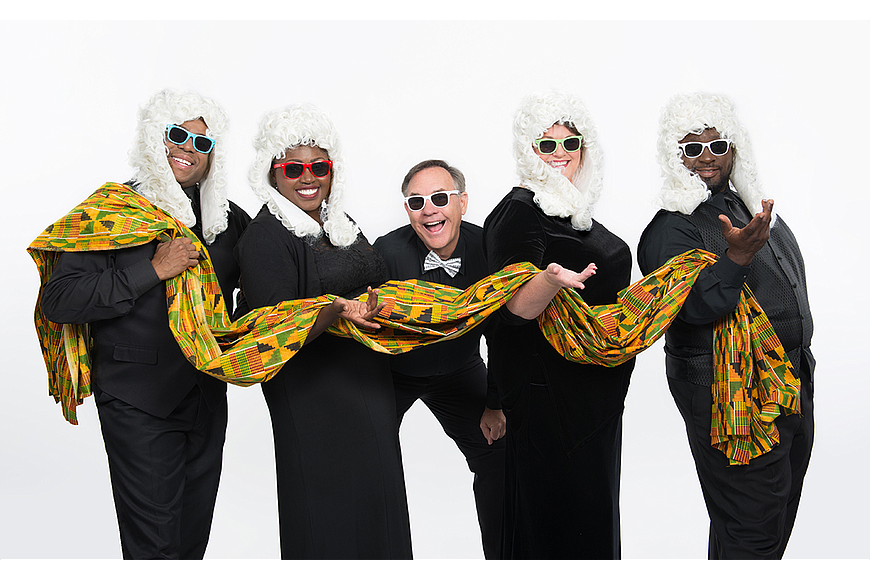- November 23, 2024
-
-
Loading

Loading

At approximately 5:34 last Sunday afternoon, an eruption of sound occurred at the Sarasota Opera House which would have registered at least 8.0 on the Richter scale and lifted the roof of that venue a good six inches. Not an earthquake, it was the outpouring of applause and cheers for a completely sold-out performance of “Too Hot to Handel” presented by the Gloria Musicae Singers and West Coast Black Theater Troupe.
“Too Hot to Handel”— a contemporary Gospel, Jazz and Motown version of Handel’s “Messiah” was conceived by Marin Alsop, conductor of the Baltimore Symphony, and arranged by Bob Christianson and Gary Anderson some twenty-five years ago. An instant hit, it has since been performed annually for the last fifteen years in both Detroit and Chicago, as well as an increasing number of cities across the United States.
Bringing it to Sarasota was the idea of Joseph Holt, Artistic Director of Gloria Musicae, and being the champion of collaboration that he is, he immediately sought—and received— a partnership with Nate Jacobs and the West Coast Black Theater Troupe.
“Too Hot to Handel” uses Handel’s text and melodies, but sets them in an inspired combination of orchestral and choral arrangements that varies from full blown Gospel writing (all the choral music), to cool jazz, bebop and Motown beat, with all of it delivered in an out and out tribute to Soul Music everywhere. I heard some jazz sounds of Stan Kenton, cool Gerry Mulligan, and real down home Gospel, together with soaring voices that filled the Sarasota Opera House, but without being overwhelmed by volume. Christianson and Anderson cleverly substituted syncopated rhythms for most of Handel’s rapidly moving coloratura passages, with good results.
Soloists included Syreeta Banks, Sherwood Davis, Samone Hicks, Nate Jacobs, Elaine Mayo, and Leon Pitts from the WBTT, and Amy Connors from Gloria Musicae. They were joined by a combined chorus of almost 50 voices from Gloria Musicae and WBTT, accompanied by the “Gloria Musicae Orchestra” (primarily members of the Sarasota Orchestra), augmented by six saxophones, a Hammond B3 organ, Andrew Lapp’s piano, and George Nickson presiding at the drum set, who gave us a percussive and persuasive preview of the “Hallelujah Chorus”, using all the drums he could reach.
All the soloists were impressive in their recitatives and arias, each of which had been enhanced with both rhythm and orchestral color. Nate Jacobs’ soaring tenor virtually stole the show at the start with “Comfort Ye” and “Every Valley”, which had a rolling chorus part added to the aria. This certainly convinced all of us that this was in no way our mother’s “Messiah” — and happily so. Each soloist had a unique style and the musical setting of their numbers added emphasis to the traditional text. Elaine Mayo gave us a low, dark, and smoky voiced rendering of “But Who May Abide…” in a voice reminiscent of Savannah Churchill, accompanied by smooth reed sounds with just a bit of bebop in their flavor.
And on and on it went. Then Amy Jo Connors’ stirring gospel rendition of “He Shall Feed His Flock”, together with driving rhythm and chorus, served to prepare everyone for the final numbers: “His Yoke is Easy”, with virtuoso bass playing by John Miller, and the Grand Finale—“ Hallelujah Chorus”, which everyone had been waiting for.
The “Hallelujah Chorus” which has deep meaning for so many of us, ended the performance: a forceful, driving, full-out gospel hand-clapping celebration of everything this wonderful work has to offer for any season. The audience could not stop applauding and cheering—and they were rewarded with a reprise of the final soul-lifting moments.
It was reported that a couple of people left early in the performance, saying that “It was a travesty of Messiah”! Not so ... Handel, with his flair for ornamentation and improvisation, would have loved it! And perhaps “Too Hot to Handel” could become an annual visitor.